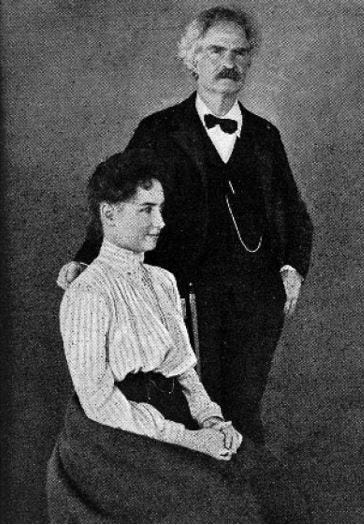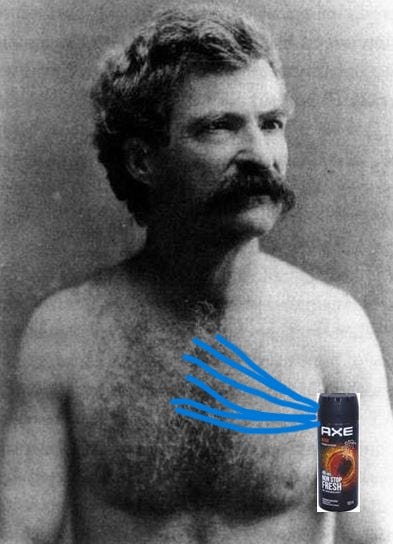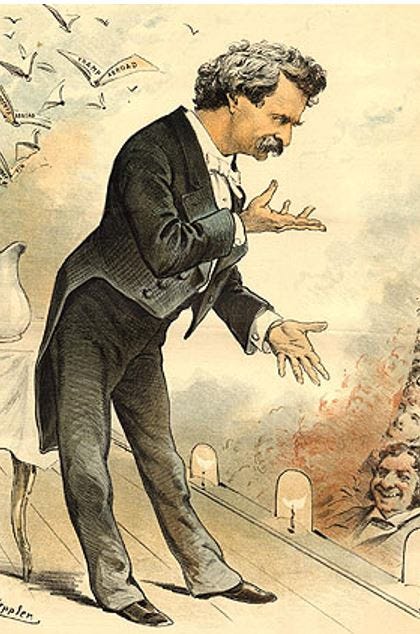Mark Twain Is the Axe Body Spray of Fundraising
The title makes sense if you read to the end...
A few weeks ago, we took a look at Florence Nightingale and how she was one the first people to introduce statistics into her fundraising.
Nightingale never read Mark Twain’s novels (and I doubt she would have liked them even if she had), but I suspect she would have admired the lengths Twain went to when raising money for others in need.
For one, Twain raised the money to send a young Helen Keller to college. He then stepped forward to help her fundraise for the blind after she graduated. Theirs is a fantastic story about how humor and laughter make raising money a little more fun.
Hold on to your wallets, everybody. Mark Twain is about to do stand-up routine for charity.
Long story short: Twain (age 60) met Keller (age 14) at a party in 1895. Both were already famous—Twain for his novels and Keller for the extraordinary story of her disability and education. Twain spent the afternoon telling Helen funny stories (she could “read” his speech by placing her middle finger on his nose, her forefinger on his lips, and her thumb on his throat as he spoke). The following year, he leveraged his relationship with some of his Standard Oil robber baron friends to raise the money to send Keller to Radcliffe College. (I believe she graduated with a major in English Literature and Languages at Radcliffe but Google can’t quickly confirm this for me and I can’t find it in my notes. Her English major is what likely made her such a great fundraiser for the blind!)

They corresponded regularly, read each other’s work, and enjoyed one of the most unlikely friendships in literary history. When Twain died in 1910, Keller’s grief was profound.
Twain had always been a popular lecturer and toastmaster, known for a slow, straight-faced delivery of side-splitting stories. So he didn’t hesitate whenever Keller asked him to work a crowd and help her raise money for the blind.
In March 1906, Twain addressed the New York Association for Promoting the Interest of the Blind (read the full speech here). At one point in his remarks, he made the case that he was the right person to ask them for money because he, of all people, knew what it was like being blind.
He launched into a story about the time he woke up in the middle of the night in search of a lost sock. The crowd roared at Twain’s drawling account of his “exploring expedition” in the pitch black of an unfamiliar hotel room: overturning chairs, knocking his head on tables, breaking a mirror, and spilling a pitcher of water on his sleeping friend. Twain chews the scenery before reflecting solemnly: “I have never found that sock, but the hours of darkness I experienced in the exploration in that room were not empty hours […] that adventure taught me what it was to be blind […] You try it and see how serious it is to be as the blind are and I was that night.”
He then asked the crowd to support the blind with their gifts of friendship and a donation.
I don’t know how much money Twain raised that night, but he brought the house down.
When I first studied the above story, I immediately thought it was in poor taste. Is making fun of the blind really the right way to raise money, Mark Twain? It felt cheap. And sort of stupid.
But take another look at the story and you’ll see he’s actually making himself (not the blind) the butt of his joke. The crowd laughs at his loopy antics in a dark hotel room and the absurdity of his claim to know what the blind experience. Argue with me in the Comments if you think I’m wrong.
I understand what makes Twain’s story funny—I, myself, have been referred to as the Mark Twain of Substack in some of its more rarefied circles—and I think I understand why he tells it:
He’s Mark Twain. The crowd is expecting a funny story. It’s probably why they’re there in the first place.
The funny story is essential set-up to his ask. The ask he makes for a donation won’t hit without it.
What better way to get a crowd of people to let their guard down before you ask them for a donation? What better way to get them to stop thinking about how much they’ll be hit up for than to give them permission to laugh at something? What better way to get prospective donors in a mood to give than to make them smile?
Like many good comedians, Twain understands there’s power in being the butt of the joke. And by getting his crowd to laugh, he gets them ready to give more than they might have otherwise.
I’ll do a post next month about how Helen Keller raised money for the blind. Until then, I’ll leave you with a parting observation about the difference between how Keller and Twain raise money for the blind:
Keller’s fundraising was like a dab of perfume on the wrist. Subtle and enticing. Barely there, but memorable. Inviting. Hospitable.
Twain’s fundraising was like a big, fat, bold blast of Axe Body spray across the chest and pits. Overpowering, obvious, and a little (playfully) obnoxious.

Like every teenager I’ve ever walked by who wore too much Axe Body spray, I could smell them before I saw them. And when Twain is on the fundraising circuit, you know you can smell him coming from a mile away:
His humor will be a little overwhelming.
His delivery will seem subdued, but it’s pungent as hell.
His conclusions will be wildly, absurdly over the top.
It’ll be hard to ignore him.
But unlike teenagers drenched in Axe Body Spray, we should celebrate that Twain’s approach to fundraising rubbed off on those around him.










Kaitlyn, please don't encourage him. Dan, no one has ever referred to you as "the Mark Twain of Substack". Excellent post though, I really enjoyed it.
Upon further reflection, I think Dan needs to grow a long mustache, get some period clothes, and do some Sam Clemons shows for fundraising. I am not sure he can slow his speech down enough, but it would be fun to watch!